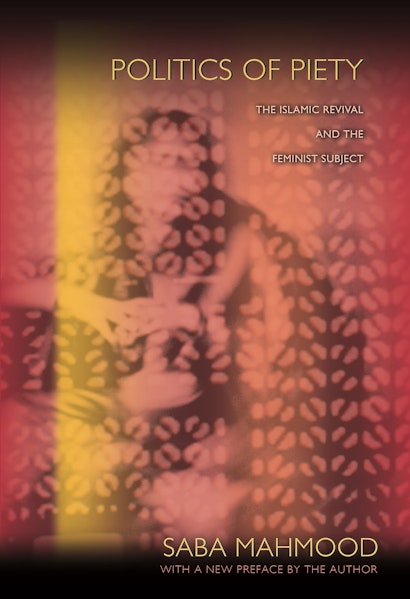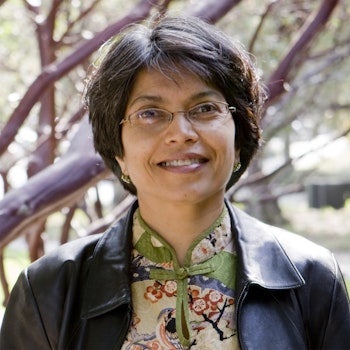Politics of Piety is a groundbreaking analysis of Islamist cultural politics through the ethnography of a thriving, grassroots women’s piety movement in the mosques of Cairo, Egypt. Unlike those organized Islamist activities that seek to seize or transform the state, this is a moral reform movement whose orthodox practices are commonly viewed as inconsequential to Egypt’s political landscape. Saba Mahmood’s compelling exposition of these practices challenges this assumption by showing how the ethical and the political are indelibly linked within the context of such movements.
Not only is this book a sensitive ethnography of a critical but largely ignored dimension of the Islamic revival, it is also an unflinching critique of the secular-liberal assumptions by which some people hold such movements to account. The book addresses three central questions: How do movements of moral reform help us rethink the normative liberal account of politics? How does the adherence of women to the patriarchal norms at the core of such movements parochialize key assumptions within feminist theory about freedom, agency, authority, and the human subject? How does a consideration of debates about embodied religious rituals among Islamists and their secular critics help us understand the conceptual relationship between bodily form and political imaginaries? Politics of Piety is essential reading for anyone interested in issues at the nexus of ethics and politics, embodiment and gender, and liberalism and postcolonialism.
In a substantial new preface, Mahmood addresses the controversy sparked by the original publication of her book and the scholarly discussions that have ensued.
Awards and Recognition
- Winner of the 2005 Victoria Schuck Award, American Political Science Association
- Honorable Mention for the 2005 Albert Hourani Book Award, Middle East Studies Association
"Mahmood's book is a tour de force that provides an alternative prism through which we may understand the women's mosque movement in Egypt."—Cynthia Nelson, Middle East Journal
"This very timely book opens doors into spaces of Islamic piety that shatter the stereotypes which dominate thinking in the West. Mahmood carefully unpacks the distortions that common modes of liberalism and feminism impose on the Muslim world. She combines richness of description with theoretical sophistication to provide insight into the struggle of some Muslim women to live their faith, often in the face of not only Western liberal influences but also Arab nationalism and political Islamism. The reader is forced to face dilemmas that cannot be easily resolved. This is social science at its most illuminating."—Charles Taylor, Board of Trustees Professor of Law and Philosophy, Northwestern University, author of Sources of the Self: The Making of the Modern Identity
"This very timely book opens doors into spaces of Islamic piety that shatter the stereotypes which dominate thinking in the West. Mahmood carefully unpacks the distortions that common modes of liberalism and feminism impose on the Muslim world. She combines richness of description with theoretical sophistication to provide insight into the struggle of some Muslim women to live their faith, often in the face of not only Western liberal influences but also Arab nationalism and political Islamism. The reader is forced to face dilemmas that cannot be easily resolved. This is social science at its most illuminating."—Charles Taylor, Board of Trustees Professor of Law and Philosophy, Northwestern University, author of Sources of the Self: The Making of the Modern Identity
"This brilliant study of women in the contemporary mosque movement in Egypt is a provocative challenge to secular feminists and a testament to what anthropology can still offer—through its insistence on serious listening to other worlds—to critical social theory. No feminist theorist or anthropologist of modernity will be able to think the same way about liberalism, agency, or religion after reading this book. I hope that Mahmood's incisive analysis of the Islamic movement will also finally put an end to the banalities that currently masquerade as knowledge about this meaningful social movement."—Lila Abu-Lughod, Professor of Anthropology, Columbia University, author of Veiled Sentiments: Honor and Poetry in a Bedouin Society
"This brilliant study of women in the contemporary mosque movement in Egypt is a provocative challenge to secular feminists and a testament to what anthropology can still offer—through its insistence on serious listening to other worlds—to critical social theory. No feminist theorist or anthropologist of modernity will be able to think the same way about liberalism, agency, or religion after reading this book. I hope that Mahmood's incisive analysis of the Islamic movement will also finally put an end to the banalities that currently masquerade as knowledge about this meaningful social movement."—Lila Abu-Lughod, Professor of Anthropology, Columbia University, author of Veiled Sentiments: Honor and Poetry in a Bedouin Society
"My enthusiasm for this brave and stunning book is unqualified, and I learned something on every page. Politics of Piety will reorient the way in which cultural theorists regard religious practice and the account of moral agency. It will be of widespread interest not only to anthropologists of various persuasions but also to scholars of Middle East studies, to moral philosophers, to religious studies scholars and lay readers, and to theorists of embodiment across the disciplines."—Judith Butler, Maxine Elliot Professor of Rhetoric and Comparative Literature, University of California, Berkeley, author of Bodies That Matter
"My enthusiasm for this brave and stunning book is unqualified, and I learned something on every page. Politics of Piety will reorient the way in which cultural theorists regard religious practice and the account of moral agency. It will be of widespread interest not only to anthropologists of various persuasions but also to scholars of Middle East studies, to moral philosophers, to religious studies scholars and lay readers, and to theorists of embodiment across the disciplines."—Judith Butler, Maxine Elliot Professor of Rhetoric and Comparative Literature, University of California, Berkeley, author of Bodies That Matter
"Mahmood's keenly anticipated and very brave book is a brilliant contribution to the theoretical project for the anthropological study of Islam and to our understanding of Islam in the Middle East, especially as it is practiced by women. There is no question that it is highly significant for all kinds of reasons. The kind of data that the author presents is fresh and relatively unknown in the literature."—Steve Caton, Professor of Contemporary Arab Studies and Social Anthropology, Harvard University, author of Peaks of Yemen I Summon
"Mahmood's keenly anticipated and very brave book is a brilliant contribution to the theoretical project for the anthropological study of Islam and to our understanding of Islam in the Middle East, especially as it is practiced by women. There is no question that it is highly significant for all kinds of reasons. The kind of data that the author presents is fresh and relatively unknown in the literature."—Steve Caton, Professor of Contemporary Arab Studies and Social Anthropology, Harvard University, author of Peaks of Yemen I Summon


